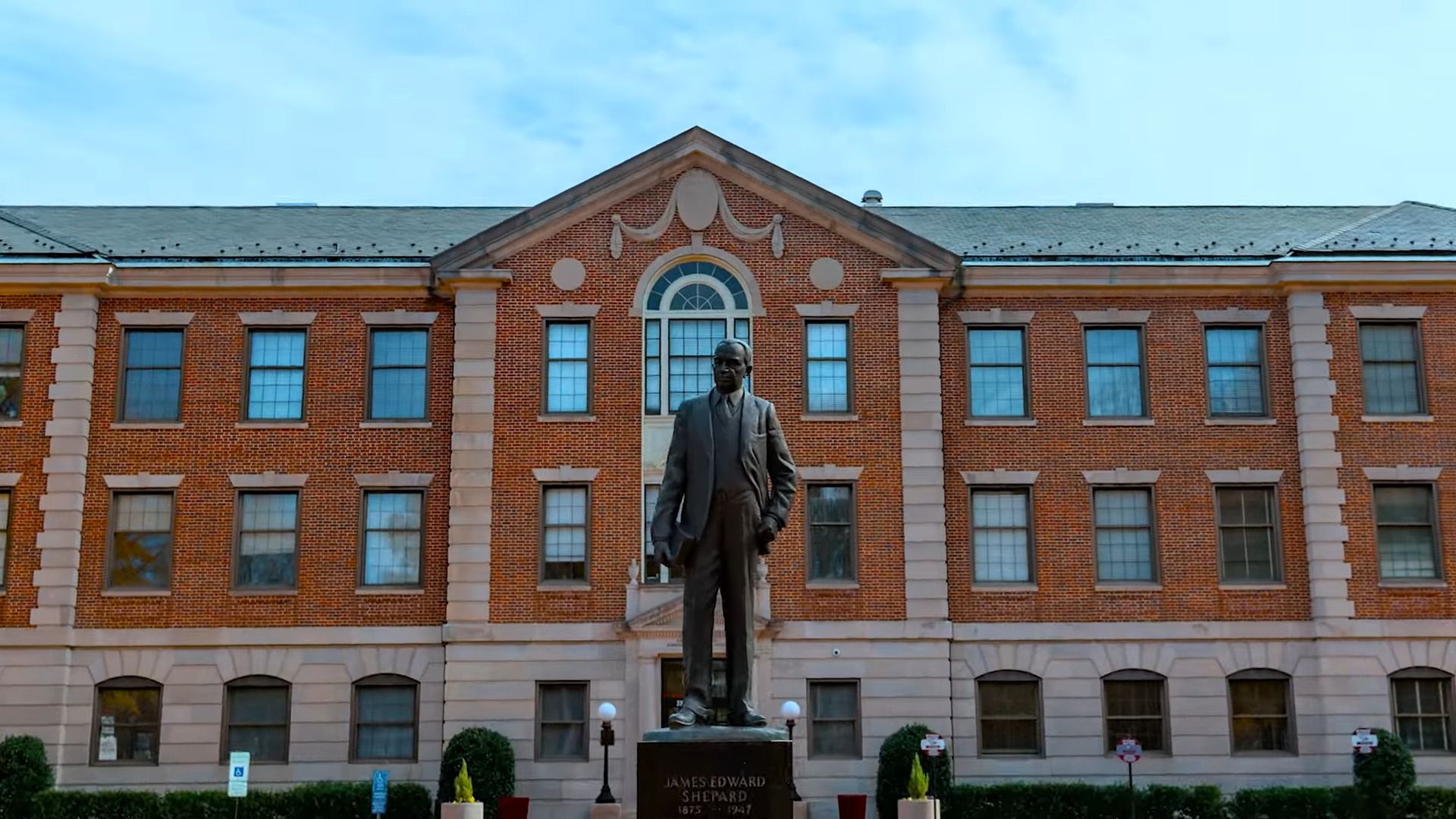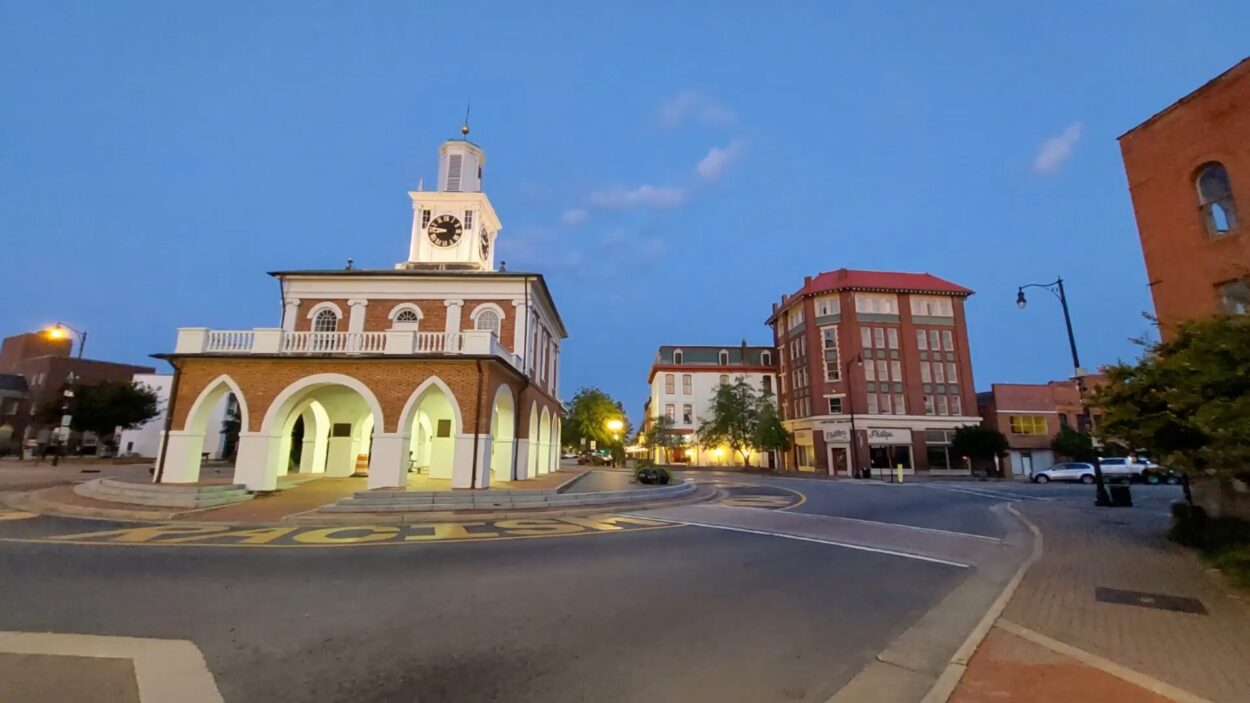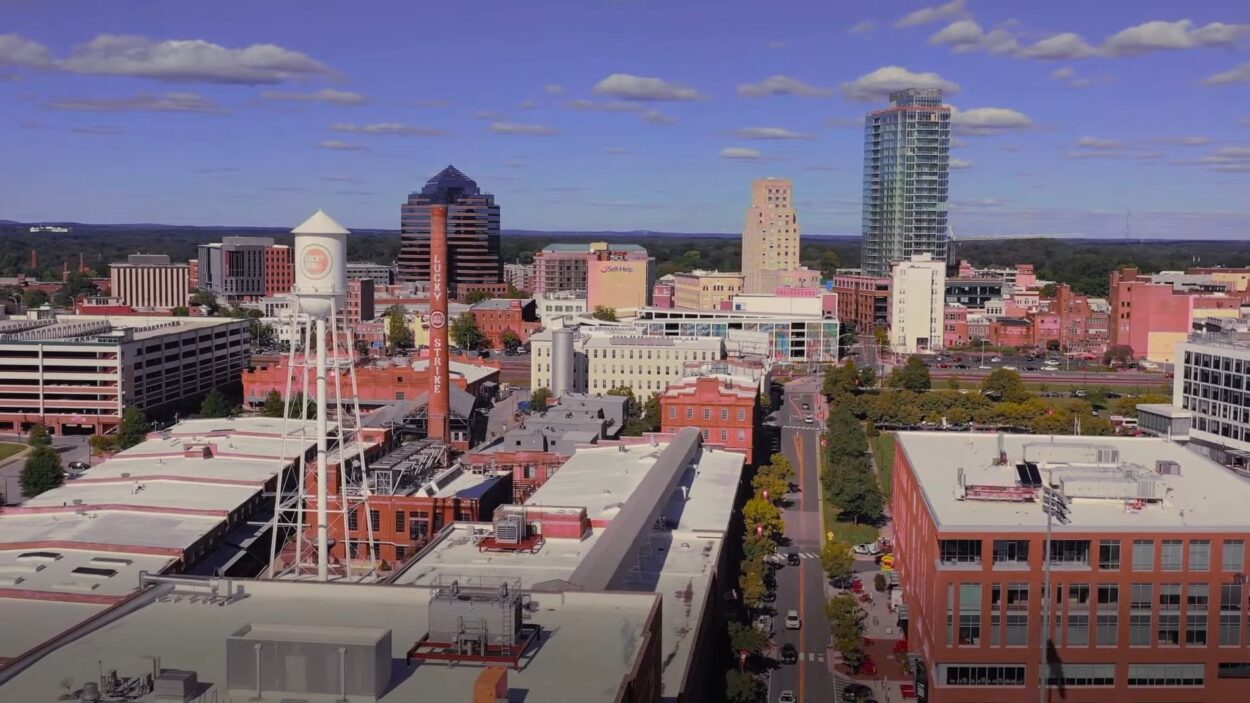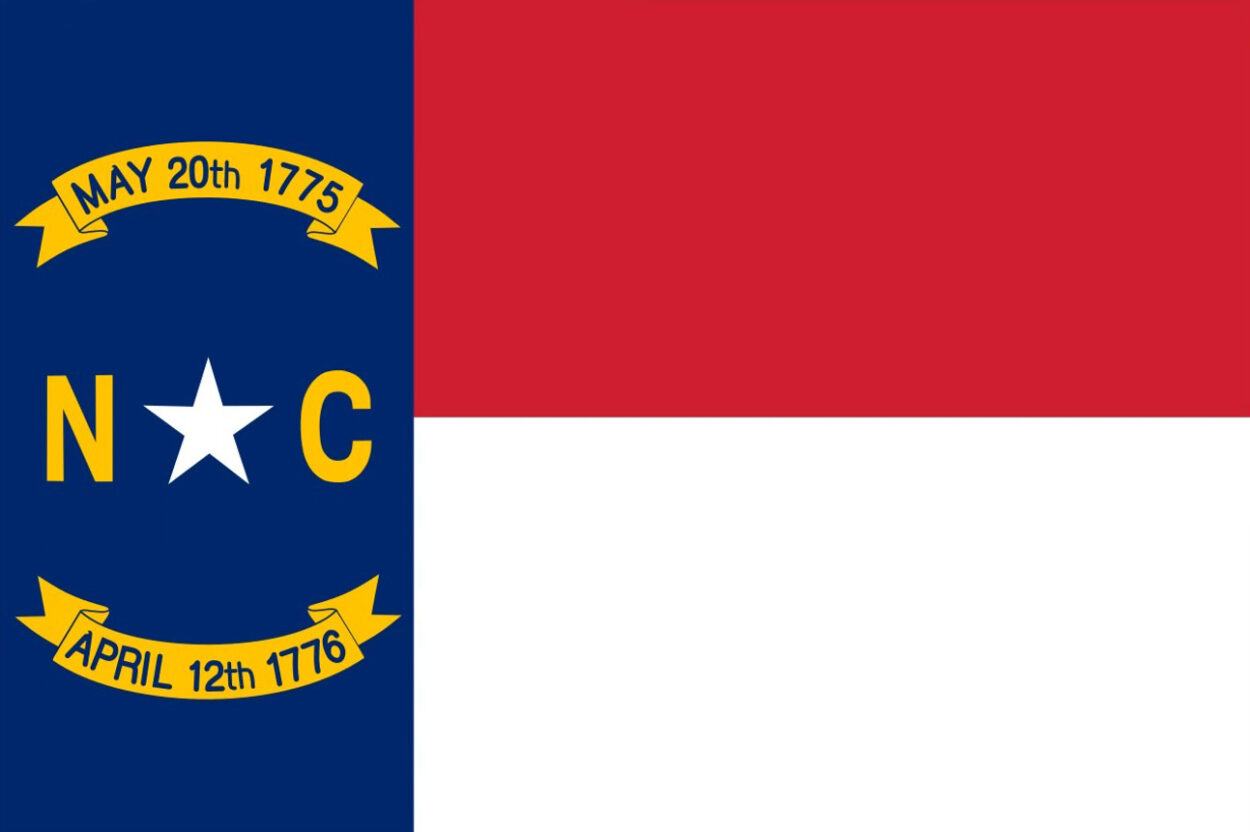North Carolina, a state of vast landscapes and vibrant cities, has always been close to my heart. With its rich history, diverse culture, and booming industries, it’s no wonder that this state is home to some of the most populous cities in the U.S.
As a traveler who has wandered through its streets, marveled at its skyscrapers, and immersed in its local flavors, I’m excited to share my personal journey through the biggest cities of North Carolina. Let’s embark on this adventure together!
10. Concord: The City of Harmony
- Incorporation Year: 1796
- Population: Approximately 105,240 residents
- Growth Over a Decade: An impressive 33%
- Land Expanse: A vast 64 square miles
- Geographical Region: Nestled in the Piedmont Triad
- County Affiliation: Cabarrus County
- Official Portal: Concord’s Official Website
- Key Industries:
- Advanced manufacturing
- Aviation and aerospace
- Automotive and motorsports
- Food and beverage sector
- Health care industry
- Major Employers:
- Atrium Health Cabarrus
- Hydromer
- Motor Racing Network
- Nanotech
- NASCAR
- S&D Coffee and Tea
- Shoe Show
- Speedway Motorsports
- Sysco
- Sports Highlight: The renowned Charlotte Motor Speedway
- Recent Developments: In July 2021, the beverage packaging giant, Ball Corporation, announced a whopping investment of $383.8 million, aligning with Red Bull and Rauch’s beverage manufacturing hub in Concord.
- Historical Tidbit: Concord holds the distinction of being the site of the first documented discovery of gold in the U.S. back in 1799.
Concord has always struck a chord with me, thanks to its harmonious spirit, making it an ideal place for families. Its streets proudly display historical markers unveiling intriguing tales from its past, while its modern industries add a refreshing contemporary touch.
The Charlotte Motor Speedway is a must-visit for any racing enthusiast. However, I do wish the city had more diverse culinary options, but the local flavors are undeniably delicious.
9. High Point: The Pinnacle of North Carolina’s Railways
Established in 1859, High Point is aptly named for its unique distinction as the highest point along the North Carolina railroad. This city, with its rich history and vibrant industries, has always been a beacon of progress and innovation.
- Year of Incorporation: 1859
- Population Count: A thriving community of 114,059 residents
- Decade-long Growth: A steady 9% increase
- Land Spread: Spanning over 58 square miles
- Geographical Locale: Situated in the Piedmont Triad region
- County Associations:
- Guilford
- Randolph
- Davidson
- Forsyth
- Official Web Portal: High Point’s Official Website
- Predominant Industries:
- Furniture manufacturing, reflecting its global reputation
- Textile production, a nod to its historical roots
- Health care, catering to its growing population
- Major Employers:
- Aetna, a testament to its health care industry
- Alorica
- Environmental Air Systems
- Quest Diagnostics
- Fashion giant, Ralph Lauren
- Volvo Group, symbolizing its industrial strength
- Wake Forest Baptist Health
- XPO Logistics Supply Chain
- Educational Spotlight: High Point University, a hub of academic excellence and innovation
- City’s Claim to Fame: High Point proudly wears the title of the “Home Furnishings Capital of the World,” a testament to its global impact in the furniture industry.
- Did You Know?: An event that truly puts High Point on the global map is the High Point Furniture Market. This biannual extravaganza draws an astounding 75,000 vendors and visitors from over 100 countries, transforming the city into a global marketplace and a melting pot of cultures.
High Point, aptly named, indeed feels like the pinnacle of craftsmanship. The furniture here is unparalleled, and the biannual Furniture Market is an event I always look forward to.
The city’s railway history adds a rustic charm. On the downside, the city can get quite crowded during market events, so plan your visits accordingly.
8. Wilmington: The Hollywood of the East Coast
- Year of Foundation: 1739
- Population Dynamics: Home to 115,451 vibrant souls
- Growth Over the Past Decade: A commendable 8% increase
- Geographical Spread: Covering a scenic 53 square miles
- Region: Located in the picturesque Cape Fear area
- County Affiliation: New Hanover County
- Online Presence: Wilmington’s Official Website
- Core Industries:
- Health care, reflecting its commitment to community well-being
- Manufacturing, showcasing its industrial prowess
- Construction, symbolizing its ever-evolving skyline
- Entertainment, a nod to its cinematic legacy
- Major Employers:
- Cellco Partnership
- Mastec Services
- New Hanover Regional Medical Center, a beacon of health care excellence
- PPD Development
- Retail giant, Walmart
- Academic Highlight: University of North Carolina at Wilmington, an institution that fosters innovation and academic growth
- City’s Unique Feature: Wilmington proudly houses the EUE Screen Gems Studios, which stands as the largest television and film production facility outside of California in the U.S.
- A Cinematic Revelation: Wilmington’s contribution to the world of cinema is unparalleled. With over 300 films and television shows produced in its studios, the city has rightfully earned the moniker “Hollywood of the East Coast.” As a traveler, walking through its streets often feels like stepping onto a movie set, with each corner holding a story of its own.
Wilmington is a filmmaker’s dream and a traveler’s delight. The EUE Screen Gems Studios tour was a highlight of my visit.
The Cape Fear River’s serene views are calming, and the city’s film history gives it a unique character. However, I found the nightlife a bit lacking in variety, but the local breweries more than made up for it.
7. Cary: The Technological Gem of North Carolina
Founded in 1871, Cary is named after the Prohibitionist Samuel Cary. While it’s technically a town, its influence and growth rival that of many cities.
- Year of Establishment: 1871
- Population: A bustling 174,721 residents
- Growth in the Last Decade: A remarkable 29% surge
- Land Expanse: Spreads across 60 square miles
- Region: Nestled in the Piedmont region
- County Affiliations:
- Wake
- Chatham
- Online Portal: Cary’s Official Website
- Key Industries:
- Health care, ensuring the well-being of its residents
- Manufacturing, a testament to its industrial strength
- Technology, driving innovation and progress
- Major Employers:
- American Airlines
- Global Knowledge
- HCL America
- Insurance giant, MetLife
- Precision Walls
- SAS Institute
- Siemens Medical Solutions
- Verizon Precision Walls
- Educational Spotlight: Wake Technical Community College, fostering technical expertise and innovation
- Noteworthy Fact: Cary takes pride in being home to the SAS Institute, the world’s largest private software developer.
- A Fun Tidbit: Despite its size and influence, Cary remains a town in official terms, showcasing its humble origins and community-driven spirit.
Cary, though technically a town, feels every bit a city. The blend of technology firms and green spaces is commendable. SAS Institute’s campus is impressive, and the local parks are perfect for relaxation.
However, the rapid growth does mean traffic can be a bit challenging during peak hours.
6. Fayetteville: A City of Heroes and History
- Year of Incorporation: 1783
- Population Dynamics: Home to 208,501 proud residents
- Decade-long Growth: A steady 4% increase
- Land Coverage: A vast 145 square miles
- Region: Located in the scenic Sandhills region
- County Association: Cumberland County
- Official Web Presence: Fayetteville’s Official Website
- Predominant Industries:
- Defense, reflecting its military heritage
- Government, as a key administrative hub
- Health care, catering to its diverse population
- Major Employers:
- Cape Fear Valley Health Systems
- Department of Defense
- Goodyear Tire and Rubber
- Retail behemoth, Walmart
- Educational Institutions:
- Fayetteville State University
- Methodist University
- City’s Claim to Fame: Fayetteville is renowned as the home to the U.S. Army post Fort Bragg and Pope Air Force Base, making it a significant military hub.
- Historical Nugget: Baseball legend Babe Ruth marked a significant milestone here. He hit his first professional home run with the Baltimore Orioles during spring training in Fayetteville in 1914, setting the stage for a legendary career.
Fayetteville, with its military heritage, evokes a sense of pride. The U.S. Army post Fort Bragg tour was enlightening.
The historical markers, especially Babe Ruth’s first home run site, add depth to the city’s character. On the downside, I wish there were more vegetarian dining options, but the local Southern cuisine is a treat.
5. Winston-Salem: The City of Peace and Revolution
Incorporated in 1913, Winston-Salem is a fusion of two towns: Winston, named after Colonel Joseph Winston, a Revolutionary War hero, and Salem, derived from the Hebrew word “shalom,” symbolizing “peace.”
- Year of Establishment: 1913
- Population: A thriving community of 249,545 residents
- Growth Over a Decade: A notable 9% increase
- Land Expanse: Covering 132 square miles
- Region: Located in the Piedmont Triad
- County Affiliation: Forsyth County
- Online Portal: Winston-Salem’s Official Website
- Key Industries:
- Health care, ensuring the well-being of its residents
- Biomedical science, driving medical advancements
- Digital media, reflecting its modern edge
- Information technology, powering innovation
- Major Employers:
- BB&T
- Hanesbrands
- Lowe’s Foods
- Novant Health Healthcare
- Reynolds American
- Wake Forest University Baptist Medical Center Hospital
- Banking giant, Wells Fargo
- Educational Spotlight: Wake Forest University, a beacon of academic excellence
- Historical Fact: Salem, established in 1766, and Winston, founded in 1849, were connected by the North Carolina Railroad. The U.S. Post Office began referring to them collectively as Winston-Salem.
- Did You Know?: In the roaring 1920s, Winston-Salem held the title of North Carolina’s largest city.
Winston-Salem, with its dual heritage, offers a blend of peace and revolutionary spirit. The historical districts are beautifully preserved, and the modern industries give it a dynamic vibe.
However, I found the public transport options a bit limited, but the city’s walkability made up for it.
4. Durham: The City of Medicine and Innovation
- Year of Incorporation: 1869
- Population Dynamics: Home to 283,506 vibrant souls
- Decade-long Growth: A remarkable 24% surge
- Land Coverage: Spans 107 square miles
- Region: Part of the renowned Research Triangle
- County Affiliations:
- Durham (seat)
- Wake
- Orange
- Official Web Presence: Durham’s Official Website
- Predominant Industries:
- Medical and health care, reflecting its title as the City of Medicine
- Research, driving global advancements
- Technology, powering the future
- Manufacturing, showcasing its industrial strength
- Major Employers:
- Blue Cross Blue Shield of NC
- Cree
- Durham VA Health Care System
- Fidelity Investments
- Pharmaceutical giant, Glaxosmithkline
- IBM
- IQVIA
- RTI International
- Educational Institutions:
- Duke University
- North Carolina Central University
- Interesting Fact: Despite its vast influence, downtown Durham occupies less than 1 square mile.
- City’s Moniker: Durham proudly wears the title “City of Medicine, USA,” with over 300 medical and health-related firms calling it home.
Durham, the City of Medicine, is a hub of innovation. The Research Triangle Park is a testament to its forward-thinking ethos.
The blend of academic institutions and tech companies gives it a youthful energy. However, the city can get quite busy during academic events, so plan your visits accordingly.
3. Greensboro: The City Honoring a Revolutionary Hero
- Year of Foundation: 1808
- Population: A bustling 299,035 residents
- Decade-long Growth: An impressive 11% increase
- Land Expanse: Spreads across 126 square miles
- Region: Nestled in the Piedmont Triad
- County Affiliation: Guilford County
- Online Portal: Greensboro’s Official Website
- Key Industries:
- Health care
- Manufacturing
- Distribution
- Banking
- Major Employers:
- American Express
- Bank of America
- Moses H. Cone Health System & Affiliates
- Qorvo
- Volvo Trucks
- Sports Highlight: The Greensboro Coliseum, a frequent host of the ACC men’s basketball tournament
- Educational Institutions:
- University of North Carolina at Greensboro
- Greensboro College
- North Carolina Agricultural and Technical University
- Guilford College
- Bennett College
- Historical Fact: The foundation of Greensborough, as originally spelled, began with a mere $98 for 42 acres.
- Did You Know?: While the city is named Greensboro, many local landmarks honor the full name of Gen. Nathanael Greene.
Greensboro, named after a Revolutionary War hero, is a city that wears its history with pride. The parks and museums are well-maintained, and the city’s growth in various industries is evident.
However, I do wish there were more art galleries to showcase local talent.
2. Raleigh: The City of Oaks and Exploration
- Year of Incorporation: 1792
- Population Dynamics: Home to 467,665 vibrant souls
- Decade-long Growth: A robust 16% surge
- Land Coverage: Encompassing 142 square miles
- Region: Part of the renowned Research Triangle
- County Affiliations:
- Wake (seat)
- Durham
- Official Web Presence: Raleigh’s Official Website
- Predominant Industries:
- Life sciences
- Advanced manufacturing
- Technology
- Health care
- Major Employers:
- Duke Health Systems
- State of North Carolina
- Wake County Public School System
- Walmart
- WakeMed Health and Hospitals
- Food Lion
- Target
- IBM
- UNC Rex Healthcare System
- SAS Institute
- Harris Teeter
- Cisco
- IQVIA
- Wake County Government
- Blue Cross and Blue Shield North Carolina
- City of Raleigh
- Pro Sports Spotlight: Carolina Hurricanes (NHL)
- Educational Institutions:
- North Carolina State University
- Shaw University
- City’s Moniker: Famously known as the “City of Oaks.”
- Historical Tidbit: Originally, the city was referred to as Wake Courthouse.
Raleigh, the City of Oaks, is a blend of natural beauty and urban sophistication. The oak-lined streets are a sight to behold in autumn.
The city’s growth in the tech sector is impressive. On the downside, the rapid growth does mean that the city can feel a bit crowded at times.
1. Charlotte: The Queen City with a Revolutionary Spirit
Incorporated in 1768, Charlotte is named in honor of Princess Charlotte Sophia of Mecklenburg-Strelitz, the queen consort of George III.
- Year of Establishment: 1768
- Population: A thriving community of 874,579 residents
- Growth Over a Decade: A remarkable 20% increase
- Land Expanse: A vast 297 square miles
- Region: Located in the Piedmont region
- County Affiliation: Mecklenburg County
- Online Portal: Charlotte’s Official Website
- Core Industries:
- Banking and finance
- Technology and research
- Major Employers:
- Amazon
- Atrium Health
- Bank of America
- Duke Energy
- Honeywell
- Novant Health
- Lending Tree
- Nucor
- Passport
- Sonic Automotive
- Truist
- Walmart
- Wells Fargo
- Pro Sports Teams:
- Carolina Panthers (NFL)
- Charlotte Hornets (NBA)
- Educational Institutions:
- University of North Carolina at Charlotte
- Central Piedmont Community College
- Noteworthy Fact: Forbes ranked Charlotte as the third-fastest-growing big city in the U.S. in 2019.
- Did You Know?: During the American Revolution, Lord Cornwallis occupied Charlotte. Due to the city’s fierce resistance, he termed it “the hornets’ nest of rebellion.”
Charlotte, the Queen City, is a metropolis that still retains its Southern charm. The skyscrapers are impressive, and the city’s banking sector is evident in its skyline.
The sports events are always a highlight. However, like any big city, it does have its share of hustle and bustle, so finding quiet spots can be a challenge.
FAQ
1. Is North Carolina a good place to live?
Absolutely! North Carolina offers a unique blend of urban sophistication and rural charm. With its rich history, diverse culture, thriving job market, and scenic landscapes, it’s a state that caters to a wide range of lifestyles and preferences.
2. Is NC expensive to live in?
The cost of living in North Carolina varies depending on the region. While cities like Charlotte and Raleigh might be more expensive due to their urban amenities and job opportunities, many smaller towns and rural areas offer affordable living options.
3. Why do people move to NC?
People are drawn to North Carolina for various reasons, including its booming job market, especially in sectors like technology, healthcare, and finance. The state’s natural beauty, from the Blue Ridge Mountains to the Atlantic beaches, also attracts many. Additionally, its cultural richness, educational institutions, and relatively mild climate are significant pull factors.
4. Does it snow in North Carolina?
Yes, it does snow in North Carolina, especially in the western mountainous regions. However, the coastal and southern parts of the state experience milder winters with less frequent snowfall.
5. What is a good salary in NC?
A “good” salary in North Carolina depends on individual needs and the specific location within the state. On average, a salary of $50,000 to $70,000 can provide a comfortable lifestyle in many parts of North Carolina, but this might vary based on personal expenses and lifestyle choices.
6. Is it cheaper to live in Florida or North Carolina?
Both states have areas that are affordable and others that are more expensive. On average, North Carolina tends to have a slightly lower cost of living than Florida, especially when considering housing and property taxes. However, individual experiences might vary based on specific locations and personal choices.
7. What is a livable salary in NC?
A livable salary in North Carolina would be around $45,000 to $60,000 for a single individual, depending on the region and personal expenses. This range can provide a decent lifestyle in many parts of the state, but it’s essential to factor in individual needs and specific living costs.
Final Words
North Carolina, with its diverse landscapes and dynamic cities, offers a unique living experience. Whether you’re drawn to the bustling energy of urban centers or the serene beauty of its countryside, the Tar Heel State has something for everyone.
As with any relocation decision, it’s essential to research and visit to determine if it aligns with your personal and financial goals. But one thing’s for sure, North Carolina’s charm is undeniable.





















